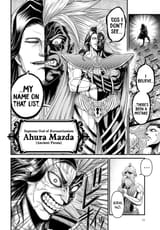Search Results
6/21/2025, 7:00:23 AM
>>17780319
Further evidence of the fragmentation of the Indo-Aryan tradition is found in the split between Vedism and Zoroastrianism, two branches born from the same Indo-Iranian trunk. One of the greatest signs of internal conflict is the inversion of the roles of the Devas and Asuras. In the Vedas, the devas are exalted as the central gods, while the asuras, although originally part of the same divine plan, appear as ambiguous figures, linked to mysterious aspects, powers not directly linked to the Vedic order, but a invisible cosmic order such as Maya (illusion/magical power), Ratri (Night) and Udaka (Waters). The asuras, like Varuna, are initially respected, but progressively associated with a more esoteric or marginal pole, until they are virtually excluded or reinterpreted in opposition to the devas. In Zoroastrianism, the situation is completely reversed: Ahura Mazda (which comes from Asura-Medhira, a title of Varuna) is the supreme god, creator of the cosmic order, and the daevas are deceptive entities. This is not a minor theological detail; it is a profound split in the cosmology, morality, and structure of the pantheon. Even more serious, there are passages in the Rigveda itself (such as in the hymn RigVeda 10.124) in which it is insinuated that central asuras such as Varuna, Agni, and Soma served Vritra, the leader of the Dasa and archetype of the serpent of chaos, whom they called “Father” before Indra.
These records show that there was a gray area between the poles of good and evil, and that these gods were later reinterpreted or even demonized in later Brahmanic literature in response to these ambiguities. Thus, far from preserving a uniform and stable oral tradition, the Indo-Aryans fought among themselves for religious authority, adapted myths according to tribal and political interests, and even completely inverted the moral axis of their deities, consciously corrupting the previous theological narrative in the name of the emerging orthodoxy.
Further evidence of the fragmentation of the Indo-Aryan tradition is found in the split between Vedism and Zoroastrianism, two branches born from the same Indo-Iranian trunk. One of the greatest signs of internal conflict is the inversion of the roles of the Devas and Asuras. In the Vedas, the devas are exalted as the central gods, while the asuras, although originally part of the same divine plan, appear as ambiguous figures, linked to mysterious aspects, powers not directly linked to the Vedic order, but a invisible cosmic order such as Maya (illusion/magical power), Ratri (Night) and Udaka (Waters). The asuras, like Varuna, are initially respected, but progressively associated with a more esoteric or marginal pole, until they are virtually excluded or reinterpreted in opposition to the devas. In Zoroastrianism, the situation is completely reversed: Ahura Mazda (which comes from Asura-Medhira, a title of Varuna) is the supreme god, creator of the cosmic order, and the daevas are deceptive entities. This is not a minor theological detail; it is a profound split in the cosmology, morality, and structure of the pantheon. Even more serious, there are passages in the Rigveda itself (such as in the hymn RigVeda 10.124) in which it is insinuated that central asuras such as Varuna, Agni, and Soma served Vritra, the leader of the Dasa and archetype of the serpent of chaos, whom they called “Father” before Indra.
These records show that there was a gray area between the poles of good and evil, and that these gods were later reinterpreted or even demonized in later Brahmanic literature in response to these ambiguities. Thus, far from preserving a uniform and stable oral tradition, the Indo-Aryans fought among themselves for religious authority, adapted myths according to tribal and political interests, and even completely inverted the moral axis of their deities, consciously corrupting the previous theological narrative in the name of the emerging orthodoxy.
Page 1
